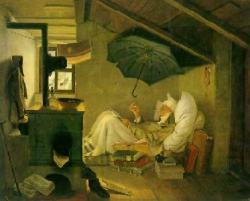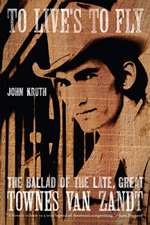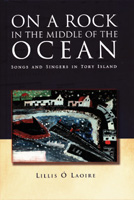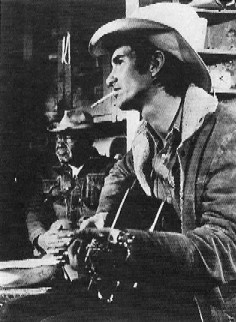FolkWorld Issue 34 11/2007; Book Reviews by Walkin' T:-)M
T:-)M's Night Shift
Texans, Okies, Tories

A Decade of Folk
|
'Sometimes I don't know where this dirty road is taking me,
sometimes I can't see even the reason why,' singer-songwriter Townes Van Zandt mused.
'But I guess I'll keep a ramblin', lots of booze and lots of gambling.
It's easier than just waitin' round to die.'
Townes had been the wandering minstrel strolling around for the sake of a song.
The people of the southern plains left their homesteads to find
occupation and good fortune. Only Tory Islanders stubbornly kept to their
barren rock in the stormy sea.
Townes who? The songwriter’s songwriter. The greatest American songwriter of
his day. You have probably heard his songs, probably not by Townes himself
but Willie Nelson and Merle Haggard, Emmylou Harris and Nanci Griffith.
Townes Van Zandt had been born into a family of Texas oilmen, lawyers and politicians in Ft. Worth, Texas in 1944.
He visited gospel churches and heard Hank Williams on the radio. Then came Elvis Presley.
I realized that guy's doin' nothin' but playin' guitar and he's got every Cadillac
in the world. He's obviously got the heart of every girl in the world. And he wears
clothes like that, so he must have all the money he wants. I gotta get me a guitar.
Townes left his upper-middle-class background to live the life of a wandering minstrel and
began performing regularly playing Dylan songs, delta blues and folk music.

John Kruth, To Live's to Fly - The Ballad of the Late, Great Townes Van Zandt.
Da Capo Press, Cambridge, MA, 2007, ISBN 978-0-306-81553-9, 326pp, US$26,-.
|
He was diagnosed a manic depressive and
went through a three-month program of electric- and insulin-shocked therapy.
His own songwriting included witty topical numbers
but soon focussed on dark and rather disturbing songs.
You're travelin' on the road, livin' the songs, and then playing them.
Townes was totally committed:
You have to get yourself a guitar or a piano; guitars are easier to carry.
And then you have to blow off everything else. You have to blow off your family.
You have to blow off comfort. You have to blow off money.
You have to blow off security. You have to blow off your ego.
You have to blow off everything except your guitar.
Guy Clark recalls:
Townes was a brave soul. Very few people are willing to go that deep and take a
hard look at the darkness. One time he was playin' a set of the saddest stuff, and
some woman in the audience said, Townes, could you play a happy song? And he
said, Man, these are the happy songs. You don't want to hear the sad ones.
His first album "For the Sake of the Song", just like the following ones,
got lost in a schmaltzy production
employing ethereal organs, gossamer harpsichord fills, and medieval recorders.
Townes acted to his motto: Just give me the money, and I'll play the damn songs.
Clark explains:
It's nobody's fault but his. He was too busy drinkin' and shootin' dice.
The way Townes looked at it, his job was writin' songs and playin' 'em
for people, not puttin' 'em on tape and makin' records out of 'em.
Accordingly, "Live at the Old Quarter, Houston, Texas"
is considered to be the Rosetta stone of his recorded works.
His 6th album was called "The Late, Great Townes Van Zandt",
after he clinically died twice in one night after a heroin overdose.
However, his producer claimed the title was chosen as
a comment on the nonexistence of Townes' career:
Because nobody was interested in Townes Van Zandt. Absolutely nobody.
His fan base was zip, zero, nada. Townes had no commercial success.
He was a blip on the radar screen.
In 1972 Townes wrote his signature tune "Pancho and Lefty".
Willie Nelson and Merle Haggard scored a number one hit duetting.
Living on the road my friend
Was gonna keep you free and clean
Now you wear your skin like iron
You breath's as hard as kerosene
|
The song paid off in a strange and unexpected way years before Townes received
his first royalty check when he was driving from Houston to Austin and got pulled
over for doing seventy-five through the little borough of Berkshire. In no time
he found himself in the backseat of the police cruiser, in the custody of a
pair of mismatched highway patrolmen. The driver was a blue-eyed Aryan type with
a blond crew cut, while his partner was a bronze, dark-eyed Mexican. They began
grilling Townes with all sorts of questions, like what he did for a living.
Well, I'm a traveling folksinger and songwriter, Townes confessed. Have
you ever heard that song 'Pancho and Lefty'? Well, I wrote it. The cops looked
at each other and began to grin. Finally, the Aryan-looking cop turned around
and said, Well, Townes, we're gonna drop the speeding ticket. Townes asked,
Hey, what prompted y'all to drop the speeding ticket? The cops explained
that their police-radio code names were Pancho and Lefty. Well, that sure is
nice, Townes replied with a grin. Uh, which one of y'all is Pancho?
The Mexican pointed at the Aryan and said, He is!
Townes was a notorious rambler, gambler, hell-bent drunk of the first order.
He spent a lot of time between labels - Johnnie Walker Red and Johnnie Walker Black.
He repeatedly said, he is never going to make it past 52.
He also predicted he would achieve fame only after death.
Townes Van Zandt died of a heart attack on New Year’s Day 1997.
John Kruth's (-> FW#33) To Live’s to Fly is the first-ever biography of the
Texas musician who inspired a generation of songwriters.

Peter la Chapelle, Proud to Be an Okie - Cultural Politics, Country Music and Migration to Southern California.
University of California Press, Berkeley, 2007, 350pp,
hardcover: ISBN 978-0-520-24888-5, US$ 60.00, paperback: ISBN 978-0-520-24889-2, US$ 24.95.
|
An inside look, of all things, by a Yankee from New York.
Well that's not too bad anyway. However, doing research was hard enough for Kruth:
It was eleven in the morning, a bit on the early side to be drinking, when
Guy Clark answered his front door with a bottle in his hand.
He squinted at me for a minute, sizing me up. If you burn me on this,
I'll slit your throat and drink your blood like wine, he snarled.
Reaching for a copy of "Live at the Old Quarter, Houston, Texas", the Holy
Grail of Van Zandt's oeuvre, Guy cued up Townes's surrealistic ballad "Two Girls".
Now this song is a yardstick, Clark proclaimed, That's how good it's
gotta be. The only other guy whose songs affected me like that is Ramblin' Jack
Elliott. Have you ever heard his "912 Greens"? - Sure, I replied.
I know Ramblin' Jack. - Oh you do, do ya? Guy goaded. Well,
let's just see about that. With that Guy reached over, grabbed the phone,
and punched Jack Elliott's number with the intent of putting me on the spot.
Jack, he barked, I got this little Yankee journalist here who says
he knows you...
Townes Van Zandt wasn't very fond of Oklahoma and its people. I keep quiet here
about his harsh words, but it gives me a nice bridge to the next section for he
wasn't the only one.
Between 1935 and 1960 100,000s of Dust Bowl refugees
from Texas, Oklahoma, Arkansa, Kansas and Missouri
migrated to southern California to escape joblessness and ecological devastation.
The Okies were facing animosity from white Californians,
badmouthed as white trash and irresponsible wandering hordes.
However, they also brought their music, the tapestry of pop tunes,
African American-influenced compositions, minstrel songs,
and public domain European-origin ballads.
The great majority of the 1930's performers were leaning toward the Democrats and
social programmes of the New Deal.
When Woody Guthrie and his
musical partner Maxine 'Lefty Lou' Crissman
went on the radio they started singing nostalgically about their home.
Soon they were criticizing racist attitudes of Californian people, police and politics and linking country music, Okie ethnicity and liberal issues.
Guthrie even transformed outlaw Pretty Boy Floyd
into a character who stole from the rich to pay off poor farmers' mortgages.
Drop whatever you are doing
Stop your work and worry too
Sit right down and take it easy
Here comes Woody and Lefty Lou
|
Thirty years after Guthrie the thriving local country music industry
relocated to Nashville. Merle Haggard
sang "Okie from Muskogee" which lists activities that a typical Okie shunned:
marijuana, LSD, sandals and beads, casual or free love, long and shaggy hair,
campus demonstrations, setting one'S draft card ablaze in protest of war.
The most memorable line: I'm proud to be an Okie.
Likewise Guthrie, Merle Haggard took pride in his family's Oklahoma and working-class origins.
Once an insult, it says now:
they can call me what they want to, but Okie is o.k. with me.
(Zeke Clements)
Peter La Chapelle's Proud to Be an Okie examines the
period in between, the history of country music culture in southern California,
the change the music underwent as Okie
culture was transplanted to urban California (country music is city music),
and the rightward turn of blue-collar country music into Reagan-era conservatism.
I wasn't aware of the role of Californians (better: Okie turned Californians)
in country music, and I'm glad that this gap in my knowledge has been filled.
In the 1940s migrants created a live performance-oriented music culture.
Los Angeles became the national center of country music production;
Hollywood offered opportunities for movie tie-ins with
low-budget singing-cowboy films.
Western Swing was combining jazz influences with the traditional Texas fiddle sound and
became the predominant style during the war decade.
Country fans were no longer hillbillies but
slang-talking, jazz-dancing, and sometimes cynical urban hepcats.
Country music even challenged conventional mores
with modern, multicultural and gender issues.
However, in the mid 1950s the rock'n'roll explosion sounded the death knell
for many country music artists. The remaining became increasingly patriotic,
camouflaging the genre's multiethnic roots.
On the contrary, Gram Parsons
and Chris Hillman
formed
the Flying Burrito Brothers
in the late 1960s, mixing country music with
soul and Motown influences, sporting embroidered cannabis leaves,
praising hippies, and singing about avoiding the draft.
The Byrds
turned into a country rock band recording Guthrie's
"Pretty Boy Floyd" as well as Haggard's "Life in Prison".
While the industry relocated to Nashville, folk and country flavored rock acts
like The Eagles,
Linda Ronstadt,
Joni Mitchell
and Neil Young
(-> FW#31)
adopted Los Angeles as their home base.
Not everyone belongs to a wandering race.
Tory Island
(Thoraigh, i.e island of the king's tower)
is located nine miles off the Donegal coast of Northwest Ireland.
The wedge-shaped island is approximately 5 km long and 1 km wide.
It has a population of 170 and is
the last stronghold of the Irish language in Ulster.
Its best known resident is
Patsy Dan Rodgers
who tries to greet all tourists as they arrive off the ferry from the mainland.
As a young man he was one of the leading campaigners

Lillis Ó Laoire, On a Rock in the Middle of the Ocean - Songs and Singers in Tory Island.
Cló Iar-Chonnachta, Galway, 2007, ISBN 978-1-905560-15-8, 360pp, € 35,- (incl. CD).
|
against the Government's plans to resettle the islanders on the Donegal mainland.
Today he holds the position of King of Tory,
chosen by the islanders to represent the community as a spokesman.
Patsy Dan is also an accordion player performing at the local céilís.
The musical tradition is still intact and remains an important part of Tory's culture.
In the past, most of the island's community came together in the schoolhouse
on festive nights to celebrate with a performance of music, dance and song.
The young single men about the age of twenty-one were responsible for organizing
the dance from start to finish. The first thing they had to do was get the priest's
permission, sometimes quite a sensitive task, since some priests were opposed to
such entertainments.
Following a successful request, the school seating had to be put aside to create
enough floor space for dancing, and long stools were placed by the walls for the
elders to sit on. The collection of lamps to provide enough light was another
important chore.
Nails in the floorboards were driven deeper into the wood with shore stones, so
that they would not hinder the dancing, and the floor was sprinkled with water
to damp down any rising dust.
The melodeon and later the accordion were the favorite instruments played at dances.
The box had a louder and more easily audible sound, which probably accounts
for its ousting the fiddle. In Éamonn Mac Ruairí's youth [1930-40s],
musical instruments were not that commonly available, and there was only one box
available for the dance, which was passed from player to player in various parts
of the school as they took turns in providing the music.
The dancing would continue until people would grow tired from the physical
exertion. It was then that the singers would be called upon to perform, with
the most popular of them being hailed with cries of aríst e! or
aríst í! (him again, her again).
These exalted performers would sing a second song, resulting perhaps in the
singing of between twelve and sixteen songs during the tamall ceoil,
the singing period.
When everyone was exhausted, the MC called upon Séamus Bá to throw
a song to us. Indeed, the same man needed no encouragement. He began in a sweet sad voice:
D'éirigh mé go luath...
There was a remarkable contrast between this and the noisy pounding of the
floorboards just minutes before. You could hear a pin drop on those very boards
now. Everyone listened intently to him and had their eyes fixed upon him. Six
verses he sang, every word, every note, and every turning artistically executed,
with no accompaniment save the murmur of the wind in the chimney and around the
windows, and the sound of waves breaking on the shore outside.
When all the songs had been sung, all the older people would rise and go home.
The singing formed the high point of the night, neatly dividing the events in two,
the formal and the informal.
Lillis Ó Laoire, now at Galway University, is a native of Gortahork on the coast of Donegal. He often visited Tory Island since childhood, had been drawn to
Gaelic songs and collected, learned and performed them.
On a Rock in the Middle of the Ocean is a comprehensive and thorough examination of the place that music has in an orally transmitted culture
taking the singing tradition of Tory Island as an example.
Laoire explores the occasions when songs are performed,
the songs and the singers chosen to perform,
the criteria upon which the singers are judged,
the meaning of particular songs and their relevance to the community,
the way in which the tradition is passed on from one generation to another.
Thus making clear that Gaelic song is an essential part of Tory culture
constituting the identity of the island's community.
The book was originally published in Irish as "Ar Chreag i Lár na Farraige",
and has been bow published in the series "Europea: Ethnomusicologies and Modernities"
edited by Philip Bohlman (-> FW#26) and Martin Stokes.
It includes an audio cd featuring a couple of dance tunes and, moreover,
traditional ballads popular at Tory Island,
such as "Donal Og" (e.g. compare -> FW#22) or
"Maire Bhan" (-> FW#24).
Donegal group Altan had been recording
airs such as "Cailin Gaelach" and "Tiocfaidh an Samradh"
(-> FW#14).
Now having finished this journey, I'm left to wish you a Merry Christmas and a Happy New Year. See you soon!
T:-)M's Night Shift (FW#33)
German Titles
© The Mollis - Editors
of FolkWorld; Published 11/2007
All material published in FolkWorld is © The
Author via FolkWorld. Storage for private use is allowed and welcome. Reviews
and extracts of up to 200 words may be freely quoted and reproduced, if source
and author are acknowledged. For any other reproduction please ask the Editors
for permission. Although any external links from FolkWorld are chosen with greatest care, FolkWorld and its editors do not take any responsibility for the content of the linked external websites.
FolkWorld - Home of European Music

Layout & Idea of FolkWorld © The Mollis - Editors of FolkWorld








